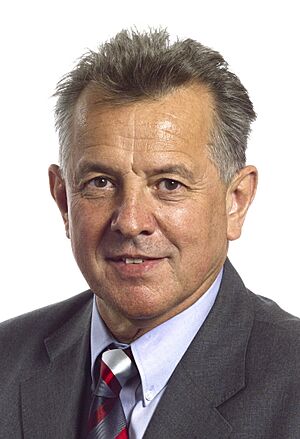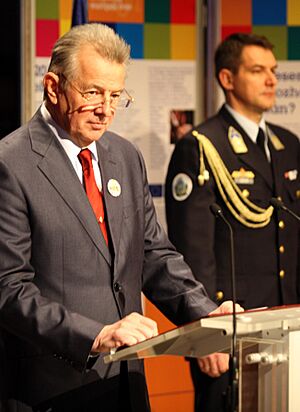Pál Schmitt facts for kids
Quick facts for kids
Pál Schmitt
|
|
|---|---|

Official portrait, 2012
|
|
| 4th President of Hungary | |
| In office 6 August 2010 – 2 April 2012 |
|
| Prime Minister | Viktor Orbán |
| Preceded by | László Sólyom |
| Succeeded by | János Áder |
| Speaker of the National Assembly | |
| In office 14 May 2010 – 5 August 2010 |
|
| Preceded by | Béla Katona |
| Succeeded by | László Kövér |
| Vice-President of the European Parliament | |
| In office 14 July 2009 – 13 May 2010 |
|
| President | Jerzy Buzek |
| Preceded by | Manuel António dos Santos |
| Succeeded by | László Tőkés |
| Member of the National Assembly | |
| In office 14 May 2010 – 5 August 2010 |
|
| Member of the European Parliament for Hungary |
|
| In office 20 July 2004 – 13 May 2010 |
|
| Personal details | |
| Born | 13 May 1942 Budapest, Kingdom of Hungary |
| Political party | Fidesz (2003–present) |
| Spouse |
Katalin Makray
(m. 1966) |
| Children | 3, including Petra |
| Signature |  |
| Olympic medal record | ||
|---|---|---|
| Men's fencing | ||
| Representing |
||
| Gold | 1968 Mexico City | Team Épée |
| Gold | 1972 Munich | Team Épée |
Pál Schmitt, born on 13 May 1942, is a Hungarian athlete and politician. He was a successful fencer who won two gold medals at the Summer Olympics. Later, he became the President of Hungary, serving from 2010 until 2012. He resigned from his role as president due to a controversy about his university studies.
Before becoming president, he worked as an ambassador for Hungary in other countries. He also served as a Vice-President of the European Parliament, which is a group of elected officials from countries in Europe. For a short time in 2010, he was the Speaker of the National Assembly of Hungary, which is like the leader of the country's parliament.
Contents
Early Life and Education
Pál Schmitt was born in Budapest, Hungary, in 1942. He grew up in a regular family. After finishing high school in 1960, he went to university. He studied about trade and business at the Karl Marx University of Economics, graduating in 1965.
Sporting Achievements
Schmitt began fencing in 1955 and became a very good athlete. Fencing is a sport where two people fight with swords. He won two national championships in Hungary. He was part of the Hungarian National Fencing Team many times between 1965 and 1977.
His biggest achievements were winning gold medals at the Summer Olympics. He won gold in the team épée event at the 1968 Summer Olympics in Mexico City and again at the 1972 Summer Olympics in Munich. He also won team and individual World Championships in fencing. He stopped competing actively in 1977.
After his fencing career, Schmitt continued to be involved in sports. He became a leader in the International Olympic Committee (IOC), which is the group that organizes the Olympic Games. He also led the World Olympians Association for several years.
Political Career
Pál Schmitt started his political career by working with the Hungarian Olympic Committee. He was its general secretary from 1983 to 1989. He also worked for the government in sports from 1981 to 1990. After communism ended in Hungary in 1989, he became the president of the Hungarian Olympic Committee.
Later, he became a diplomat, representing Hungary in other countries. He was Hungary's ambassador to Spain from 1993 to 1997 and to Switzerland from 1999 to 2002. An ambassador is a country's official representative in another country.
In 2003, he became a deputy president of Fidesz, a major political party in Hungary. He was elected as a Member of the European Parliament (MEP) in 2009. This meant he helped make decisions for the European Union. He also became one of the 14 Vice-Presidents of the European Parliament. In 2010, he became the Speaker of the National Assembly of Hungary.
President of Hungary (2010-2012)
In 2010, Pál Schmitt was elected as the President of Hungary by the National Assembly. He took office on 6 August 2010. He was supported by the Fidesz and Christian Democratic People's parties.
As president, Schmitt wanted to work closely with the government to help rebuild the country. He also wanted to play an active role in creating Hungary's new constitution. A constitution is a set of rules that a country is governed by. The new constitution was finished in 2011 and became law in 2012.
One of his main goals as president was to protect and promote the Hungarian language. He believed it was important for the country's identity.
Academic Controversy and Resignation
In 2012, a controversy arose regarding Pál Schmitt's university dissertation from 1992. A dissertation is a long paper written as part of earning a university degree. He was accused of plagiarism, which means using someone else's work or ideas without giving them credit.
A university committee investigated the matter. They found that parts of his dissertation were very similar to other works. On 29 March 2012, the university decided to take back his doctoral degree.
On 2 April 2012, Pál Schmitt announced that he would resign as president. He said he felt the debate about his dissertation was dividing the country. He stated that his conscience was clear. He later gave up his doctorate officially in 2013.
After Presidency
After leaving the presidency, Pál Schmitt continued to be involved in sports and international organizations.
In 2015, he became the chairman of the EU's Sports Diplomacy Advisory Group. This group helps use sports to build good relationships between countries.
In 2016, he was appointed Chairman of the committee for Budapest's bid to host the 2024 Summer Olympics and 2024 Summer Paralympics. This committee worked to promote Hungary's efforts to host these major international sports events.
In 2020, he was re-elected to the executive body of the Hungarian Olympic Committee. In 2021, during the COVID-19 pandemic, he supported the idea of vaccinating Olympic athletes and coaches in Hungary. This was to help them prepare for the Tokyo Olympic Games.
International Olympic Committee (IOC)
Pál Schmitt has been a long-time official with the International Olympic Committee (IOC). He joined in 1983 and held many different roles over the years. He was involved in commissions for preparing the Olympic Games and promoting sports and the environment. He also served as Vice-President of the IOC from 1995 to 1999.
Even after resigning as President of Hungary in 2012, he remained a member of the IOC. He continued to attend IOC events and meetings. In 2017, he ran for a position on the IOC Executive Board again. In 2023, he became an honorary member of the IOC, which means he is still recognized for his contributions to the Olympic movement.
See also
 In Spanish: Pál Schmitt para niños
In Spanish: Pál Schmitt para niños


